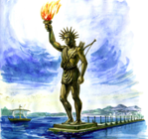Dear WJC Family,
Let us consider words with which you are likely familiar, and their composer:
“Keep, ancient lands, your storied pomp!” cries she
With silent lips. “Give me your tired, your poor,
Your huddled masses yearning to breathe free,
The wretched refuse of your teeming shore.
Send these, the homeless, tempest-tost to me,
I lift my lamp beside the golden door!”
Emma Lazarus wrote these lines in her sonnet “The New Colossus” destined to adorn the base of The Statue of Liberty. It is no coincidence that the poem at the base of that grand symbol of hospitality, was penned by Emma Lazarus, a woman who understood the power and sacredness of the hospitality afforded by this nation. The members of the Lazarus family were Sephardic Jews who had immigrated to America in the colonial period. By the time Emma wrote the poem her family ’s roots were planted in the US for generations. But she didn’t need to be an immigrant herself to see that the American hospitality offered to immigrants was like nothing the world had ever seen before in all the history of all the great civilizations.
 The Statue of Liberty says so much about the character of this great nation. The sculpture is based on the Colossus of Rhodes, a gigantic statue that stood in the harbor of that ancient Greek city, one of the Seven Wonders of the Ancient World. Lady Liberty was built in a similar stance and based on the proportions of that ancient bronze giant, but the similarities end there. The Colossus was a statue of the Titan Helios, a warlike male figure no doubt striking fear and awe into all who entered the harbor; his torch a symbol of light, but also destruction. Not so our gentle green lady of liberty. She is stately, almost scholarly rather than warlike, wielding a book and a torch to light the way of all who come here; not some weapon or symbol of military might.
The Statue of Liberty says so much about the character of this great nation. The sculpture is based on the Colossus of Rhodes, a gigantic statue that stood in the harbor of that ancient Greek city, one of the Seven Wonders of the Ancient World. Lady Liberty was built in a similar stance and based on the proportions of that ancient bronze giant, but the similarities end there. The Colossus was a statue of the Titan Helios, a warlike male figure no doubt striking fear and awe into all who entered the harbor; his torch a symbol of light, but also destruction. Not so our gentle green lady of liberty. She is stately, almost scholarly rather than warlike, wielding a book and a torch to light the way of all who come here; not some weapon or symbol of military might.
In 1883 Emma Lazarus saw the torch in Lady Liberty’s hand as a symbol for the hospitable nature of this country, for the way we welcomed and saw the value of every citizen and potential citizen. Not only would this country welcome those who were not welcome anywhere else, but she would light the way to a better life. Just two years before Emma Lazarus wrote her masterpiece, in 1881, a group of Jews founded the Hebrew Immigrant Aid Society (HIAS) in a storefront on the Lower East Side to assist Russian Jews fleeing pogroms. From those humble beginnings HIAS has become one of the premier immigrant and refugee aid organizations in the United States. It is no accident that a Jewish person wrote the poem on the Statue of Liberty or that a Jewish organization has become so prominent on immigration assistance issues. It is, as they say, in our DNA. We became a nation as refugees fleeing Egypt and we have unfortunately been immigrants to and refugees from nearly every land on this planet.
 Over the last several years immigration has once again become a prominent and controversial issue. This nation is faced with the choice of how to see the Statue of Liberty’s Torch – is it the beacon lighting the path for those cast out to the elements by others, as Emma Lazarus saw it, or is it the combative torch of Helios prepared to view all who are different with distrust and burn anyone deemed unworthy? Jewish text, law and culture stresses that we remain squarely with Emma Lazarus and her peers supporting refugees. It is in that spirit that this Shabbat we join HIAS and synagogues all over the country in commemorating Refugee Shabbat. In honor of the occasion my sermon Saturday morning will explore the Jewish approach to the topic of the treatment of refugees and immigrants.
Over the last several years immigration has once again become a prominent and controversial issue. This nation is faced with the choice of how to see the Statue of Liberty’s Torch – is it the beacon lighting the path for those cast out to the elements by others, as Emma Lazarus saw it, or is it the combative torch of Helios prepared to view all who are different with distrust and burn anyone deemed unworthy? Jewish text, law and culture stresses that we remain squarely with Emma Lazarus and her peers supporting refugees. It is in that spirit that this Shabbat we join HIAS and synagogues all over the country in commemorating Refugee Shabbat. In honor of the occasion my sermon Saturday morning will explore the Jewish approach to the topic of the treatment of refugees and immigrants.
Our Friday evening services will begin on our live stream at 5:30 led by Cantor Goldberg and Rabbi Dalton. I will be hosting our Hachanat Shabbat on Zoom starting at 5:15 for those who would like to gather to wish each other Shabbat Shalom (see the link below). Havdalah will be Saturday night at 6:45. If you would like to join us in-person at services on a Saturday morning (or a Thursday morning for minyan) please contact Rosie in the office.
See you in shul or online,